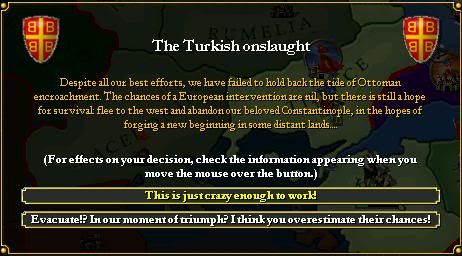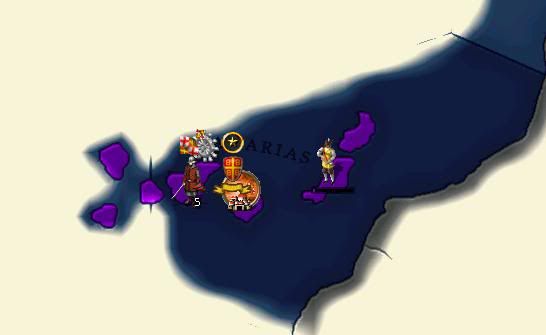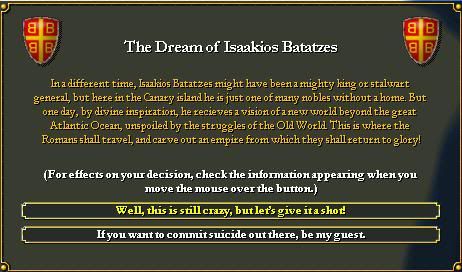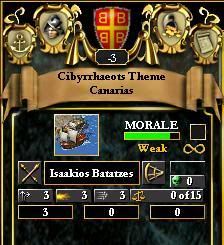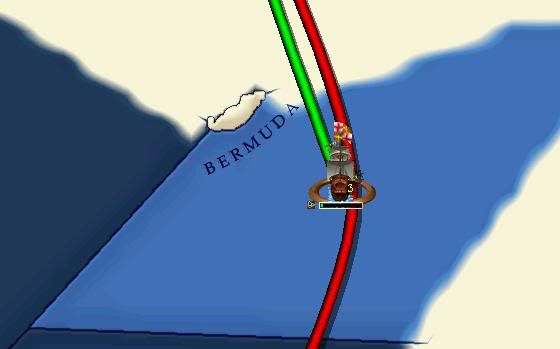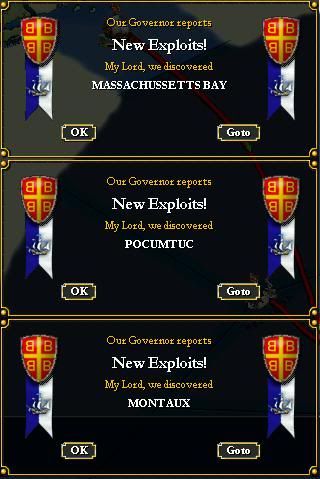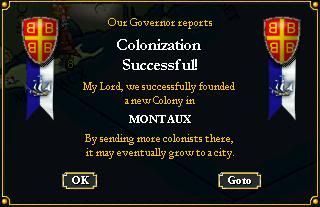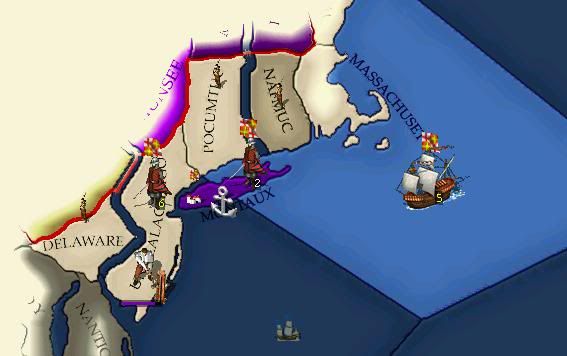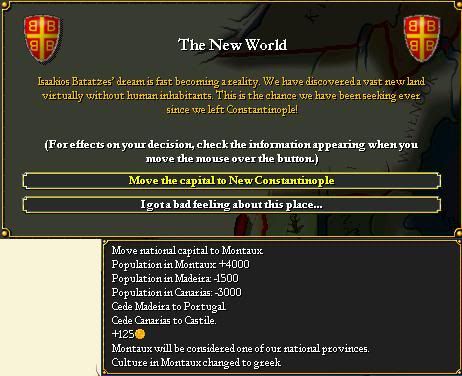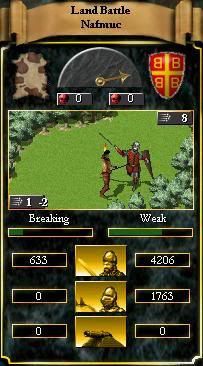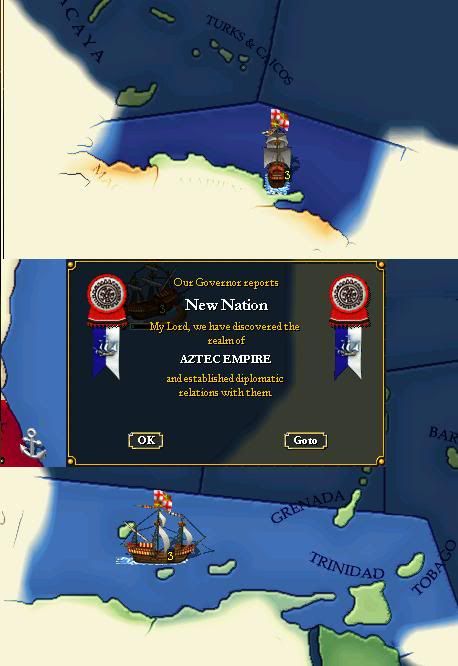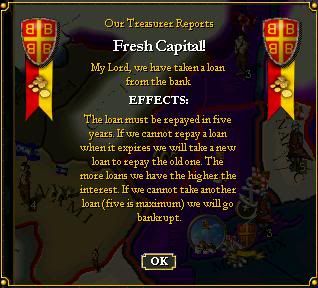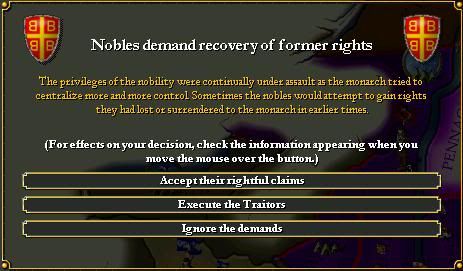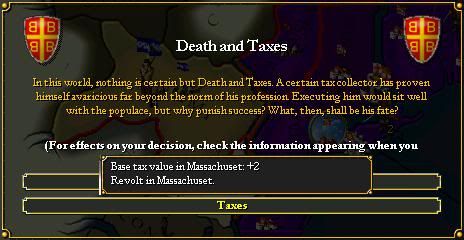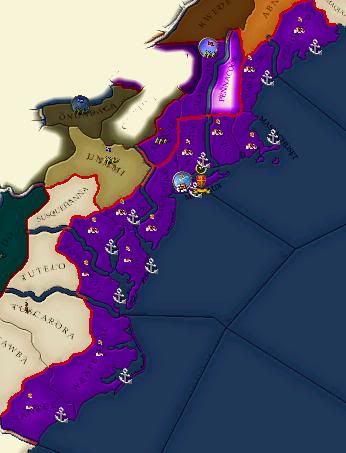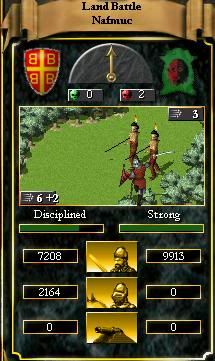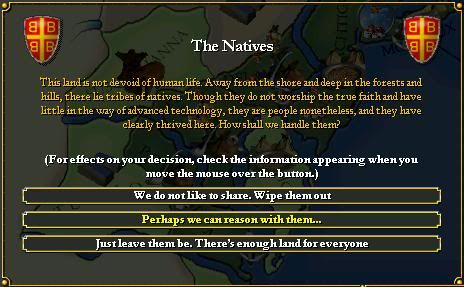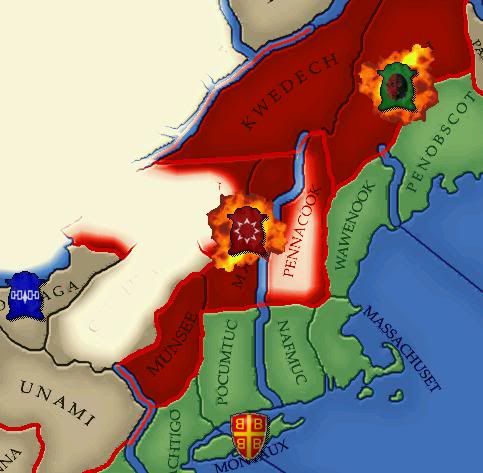TheExecuter: That presumes the Romans will rest content with that land.
 Enewald
Enewald: Eww, even worse!

American weather can be a bit extreme: hot, humid summers followed by blizzards in the winter. We're currently going through a spat just like it.
 Kurt_Steiner
Kurt_Steiner: Rome would never allow a Muslim-Turkish-Papist-Republican-Venetian swine rule the empire!


Ok, I'll admit I laughed at that.
 Strategic Fail
Strategic Fail: You know, for a minute, I thought that was what the original events called them: smelly Ottomans. Turns out it was scary... close enough.
But your point is well made. Will the ensuing generations really care what happens to their former homeland? Well, I don't know yet.
-----
'Why does that lunatic keep shouting 'Land'? Someone tell him to be quiet!' - Michael Dukas, moments after the return of Isaakios Batatzes
It did not take long for Isaakios Batatzes to return from his first voyage and report the news of his discoveries to the other Greek refugees languishing in the Canary Islands. It is said he practically leapt overboard, so anxious was he to inform everyone that he had confirmed the authenticity of his dream. Within a few hours, it was the all the whole refugee camp could talk about. To impart some order to the event and stamp out a few of the more fantastical rumors - among which that the sailors had been guided to land by the light reflecting off a mountain of gold - a great assembly was convened to allow the young explorer to tell his tale. Though hardly a skilled speaker, Batatzes held the many thousands of gathered men, women, and children spellbound as he declared that a whole new continent awaited them on the other side of the ocean.
When pressed for details, Batatzes sheepishly admitted he had none. How large this new land was, whether or not it was inhabited, how fertile the land was, let alone
where exactly it was were all questions beyond his expertise, which were decidedly minimal. Batatzes did not even have a name for it, repeatedly calling it simply 'the New World.' His crew rallied to Batatzes' defense, assuring the crowd that this New World, though an unfamiliar wilderness, would provide the refugees with everything they needed to build a new home. This was enough for the crowd, who assented to transplanting from their current base in the Canaries and Madeira to a permanent colony in the New World. Seized by the emotion of the gathering, Manuel Palaiologos stepped forward and renounced any claim to authority in favor of Isaakios. With the crowd concurring by acclamation, Manuel's spontaneous decision would mark the beginning of a new tradition in Byzantine politics: henceforth, the emperors would be appointed, rather than rule by virtue of blood.
Set upon their new course, the Greek refugees moved quickly to prepare for the long, arduous journey across the sea. Well aware of the risks they were taking in moving to the New World, the Greeks had no illusions about the enormity of the challenge facing them. Rather that simply move in one great mass, which could certainly have been accomplished with the number of ships at their disposal, and risk disease and certain starvation upon arrival, an expedition would be sent first under the command of Konstantinos Palaiologos to prepare a suitable location for their first colonial settlement. The first wave of settlers would leap-frog their way across the Atlantic, first to Bermuda and then to the mainland, while most of the women, children, and men either unfit to trailblaze or needed to defend the Canaries from attack, remained behind.
On June 16, 1426, Konstantinos and over six thousand Byzantine soldiers arrived in the New World. Konstantinos, Isaakios, and many others amongst the Byzantine vanguard had long debated where to establish their colony. It had been decided that a settlement would be established on the western edge of the island Isaakios had first dubbed New Crete. The natives already had a name for it, Montaux, but the Greeks had made no effort to communicate with the people already living in the New World. Rather, Konstantinos perceived them as a threat and used a combination of numerical superiority and the advantages his cavalry detachments provided to rout the natives and clear an area from which a new capital could be built.
Work proceeded at breakneck speeds through the summer and fall, with most of their efforts focused on constructing sufficient housing for the expected influx of colonists, while also scouting the immediate vicinity for arable land, fisheries, and hunting ground. On December 4, sheltered from a freezing winter the Greeks had scarcely known in the warm Mediterranean climate, Konstantinos decided that it was time for the first wave of colonists to begin their journey.
The first European settlement is established in the New World.
-----
June 2, 1428
Despite every bone in his body protesting the movement, Manuel Palaiologos managed to push himself out of the tiny rowboat and climb to the shore, shooing off the rowers who moved to offer him support.
Manuel smiled broadly, despite the aches and pains from all his joints, relishing the cool breeze that rolled in from the west and the sounds that filled the air around him. Common laborers, soldiers, even some priests and nobles, moved about in bustling streets ahead of him. Though the buildings were not much more than wooden shacks and the roadways unpaved dirt and mud, there was a buzz of activity; the sound of wood being sawed, of hammer against nail, the rumble of carts carrying their loads, of the blacksmith's furnace, the cry of the farmer driving a team of oxen, of pigs squealing and chickens clucking, was all around the former emperor.
It was not much, but the people of this colony were building.
"Majesty!" Manuel heard a familiar voice exclaim from a distance. Turning, the aged man chuckled at the sight of Isaakios Batatzes hurrying, or rather stumbling, through the crowded dockyard to greet him. "Welcome to the New World, Majesty!" he managed to say in between gulps of air.
"That form of address is not for me any longer," Manuel chastised Isaakios gently. "I am but an old man now. You are our emperor now."
"Yes, of course," Isaakios nodded quickly. "I keep forgetting that... but come! Let me show you around."
"I had hoped that my son might be here to greet me as well," Manuel conceded as he allowed Isaakios to guide him slowly down the road.
Isaakios cleared his throat. "Yes, Prince Konstantinos is regrettably out on another survey expedition to the mainland. He has been gone for several weeks now, so I suspect he will be returning soon to report his progress."
Manuel nodded and made a thoughtful noise. "Yes, I hear my son has already helped set up a second colony. Sozopolis, they call it? And this city?"
"We voted to call it New Constantinople."
"A suitable name," Manuel replied with a smile.
For the next hour, Isaakios guided the former emperor through the budding town, showing with breathless enthusiasm the progress the workers were making on all sorts of projects.
"It is a fine start," Manuel said after a very long silence, a warm smile crossing his worn expression. "This is a good land, Isaakios, a good place for me to be buried." Isaakios opened his mouth to say something but Manuel waved his hand. "There is no sense in denying the obvious. I am old man, perhaps too old. I have lived long enough. I give thanks to Almighty God that I have lived to see this day."
Isaakios looked down at his feet, meekly shifting his weight from one leg to the other. "It is hard to imagine myself as an emperor. Without your counsel, I don't know how I could ever hope to lead our people."
"You will have Konstantinos at your side," Manuel chuckled, reaching out with a trembling hand and resting it on Isaakios' shoulder. The young explorer reluctantly tore his gaze from his own feet and stared at the emperor.
"I'm no leader," Isaakios insisted.
"You are, you're just too humble for your own good!" Manuel teased, prodding Isaakios' chest with a bony finger. "It's been almost ten years now since we left Constantinople. People said the whole idea was crazy, yet here we are! We're here because we believed in you, in your vision.
You, Isaakios Batatzes, led us here. Whether you admit it or not, you've already proven yourself to be a leader."
Isaakios remained silent, unable to reply. He looked down at his feet again.
"Your vision," Manuel pressed, clutching the younger man's shoulder as hard as he could. "It's led us halfway across the world to a new home, and it will lead us into the future. I know you can feel it; all around us, there's a new fire kindling in the hearts of these people. It really is a New World."

